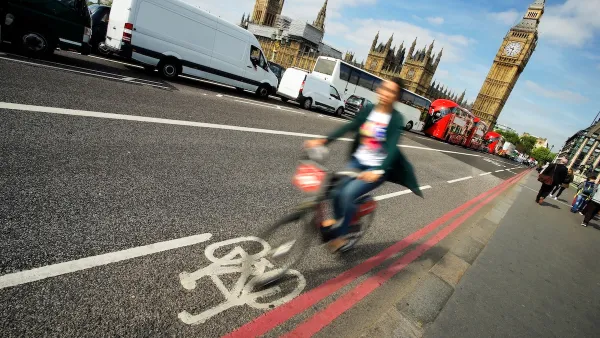In the summer of 2010, London launched a new program that had established bright blue bike lanes known as 'Cycle Superhighways' alongside main roads. These initiatives are intended to provide the quickest routes into the city centre.
The ‘Cycle Superhighways' are built ‘to improve cycling conditions for people who already commute by bike and to encourage those who don't to take to pedal power'. According to Joe Peach, recent studies by Transport for London (TfL) have found that 80% of journeys taken along the routes are cyclists commuting to and from work.
Peach states that "the TfL has stated its belief that bicycle networks can ‘strengthen London's economy by improving access to local town centres'. Whilst numerous studies suggest economic benefits from developing a city's bicycle network, the flaw in TfL's logic is that London's more recent bicycle network developments exist to improve access to the city centre, not the town centres that surround it."
FULL STORY: London's Bicycle Network: Good for Commuters, Bad for Communities

Planetizen Federal Action Tracker
A weekly monitor of how Trump’s orders and actions are impacting planners and planning in America.

Chicago’s Ghost Rails
Just beneath the surface of the modern city lie the remnants of its expansive early 20th-century streetcar system.

Amtrak Cutting Jobs, Funding to High-Speed Rail
The agency plans to cut 10 percent of its workforce and has confirmed it will not fund new high-speed rail projects.

Ohio Forces Data Centers to Prepay for Power
Utilities are calling on states to hold data center operators responsible for new energy demands to prevent leaving consumers on the hook for their bills.

MARTA CEO Steps Down Amid Citizenship Concerns
MARTA’s board announced Thursday that its chief, who is from Canada, is resigning due to questions about his immigration status.

Silicon Valley ‘Bike Superhighway’ Awarded $14M State Grant
A Caltrans grant brings the 10-mile Central Bikeway project connecting Santa Clara and East San Jose closer to fruition.
Urban Design for Planners 1: Software Tools
This six-course series explores essential urban design concepts using open source software and equips planners with the tools they need to participate fully in the urban design process.
Planning for Universal Design
Learn the tools for implementing Universal Design in planning regulations.
Caltrans
City of Fort Worth
Mpact (founded as Rail~Volution)
City of Camden Redevelopment Agency
City of Astoria
City of Portland
City of Laramie





























